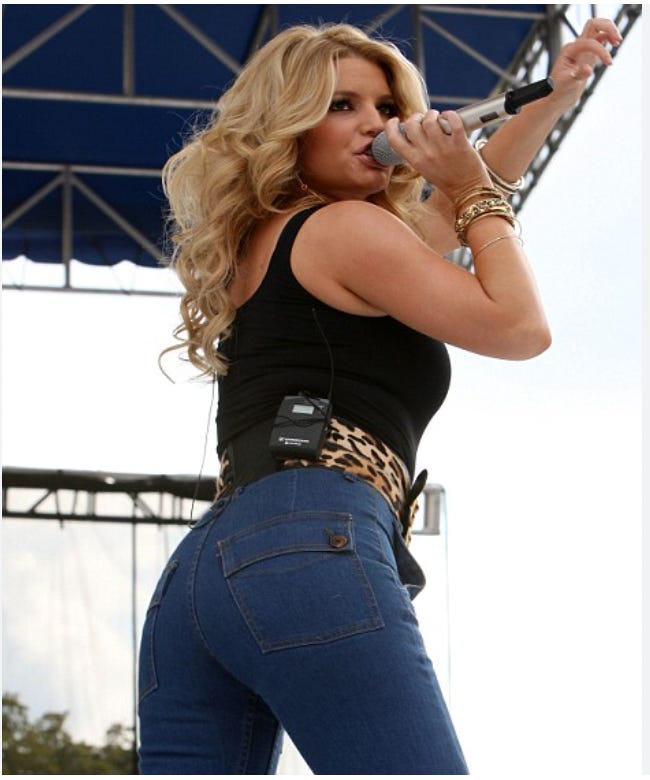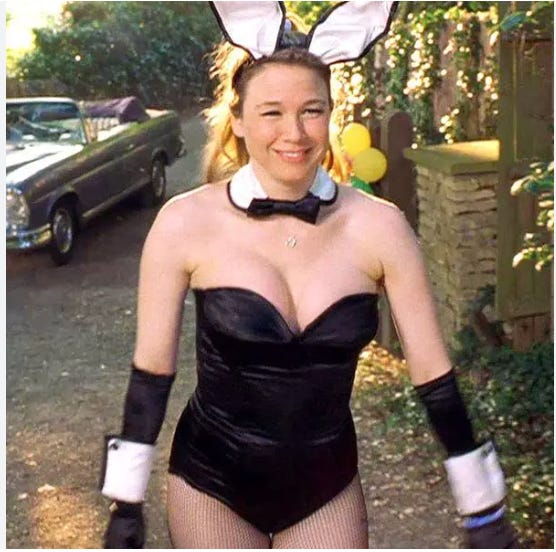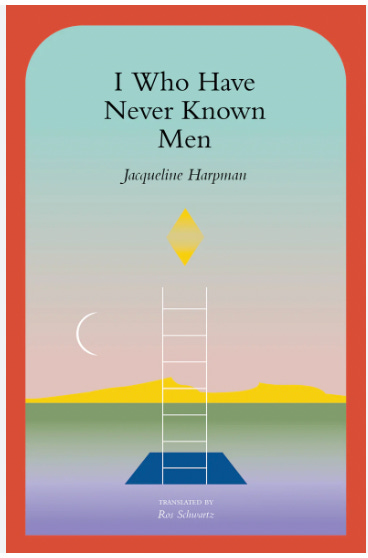It happens every few months — someone brings up the female body standards of the nineties and early two thousands. Heroine chic, extreme, regression-era thinness. Protruding hipbones and collarbones, rampant anorexia, and, more specifically to that era than our current regression-to-regression-era-thinness (steeped more in Ozempic movie theatre ads and what I’m sure history will remember as mass-psychosis style orthorexia on both sides of the gender divide,) a focus on declaring random averagely sized Hollywood women fat. That infamous picture of Jessica Simpson in jeans and a black bodysuit looking spectacular by the standards of the twenty-teens, curvaceous and strong. Kate Winslet in Titanic. And, as inspired this edition of Thanks For Listening, Renee Zelwiger in Bridget Jones’ Diary.
I rewatch Bridget Jones yearly, usually around the holidays, because it is a New Years movie. Often, I feel guilty about it, because people like to criticize the film for “aging poorly,” usually in reference to that way that Bridget’s body (image) is portrayed. She spends a lot of the film trying to get in life in order — quit smoking, improve her career, move on from shitty men, and, most notably here, lose weight. She is never above 140 pounds in the film, and Renee Zelwiger gained thirty pounds to play her. I haven’t weighed that much since I was pubescent. Visually, Bridget Jones just looks…normal. Thin, but a little fleshy. Really, she just kinda has big boobs. If she were young today, she’d probably write something wry and sentence fragmenty in her diary about reducing her cortisol or improving her gut health. Aside from one instance, there aren’t many jokes in the film at her expense — she is the only one calling herself fat, (unlike in Love, Actually, where the “fat” character of similar size is demeaned on multiple occasions.) In fact, while trying to lose this weight, good old Bridge is at the centre of a love triangle and regularly getting semi-sexually harassed by her boss for wearing tiny little skirts and sheer blouses. She thinks she’s overweight, but she also leans into her sexuality and, by the end of the film, has a fledgling career. Her weight is her preoccupation, which feels realistic to women of that age at that time.
I make all these arguments that the film is “that bad,” but I actually just don’t care about how it, or any film/book/media has “aged.” When I was in undergrad, and regrettably attempting to get a film studies minor when I probably should have been taking English classes, I took a course called History in Film. Not History of Film. IN Film. It was mostly focused on the idea of historiography, or the study of history as a discipline. In the context of film studies, this meant looking at films of historical fiction not just from a lens of what the films said about the period they depicted, but about the period in which they were made. We watched Dick, the 1999 Kristen Dunst vehicle about the 1976 Watergate scandal, and discussed not just what the film said about the 70s, but the 90s as well. How do the two period’s politics, social climate and media interests intersect? What can we learn about the 90s through a 90s depiction of the 70s? What do the Clinton years have in common with the Nixon years? What does the nostalgia cycle have to do with the way we portray the 60s and 70s? What the heck is the nostalgia cycle, and why does it exist? It was a great class, and one of the only film studies courses I took anything salient from.
Now, I take this approach when watching films. Sort of like a reverse “death of the author,” I refuse to erase the context in which a film was made from my analysis of it, or even my passive viewing. I am not interested exclusively in how a film or book holds up to the standards of today’s audiences (though it can be an interesting conversation,) I am interested in what the films say about when they were made, and able to take that at face value.
In writing, there seem to be two camps — the “timeless” and the “timely.” Do you want to tell a timeless story that could be equally meaningful fifty years from now as it was fifty years ago? Do you want to remove the human condition from any specific timeline? Do you want to remove your story from time entirely, place it in a non-specific void of semi-modernity? Or do you want to explore the human condition as it is now? Some people think its harder to be timeless, to capture something that is inherently true about the human existence, regardless of era. I actually think its harder to be timely. Its hard to write something specific about right now without it feeling cheesy, or without it becoming historical fiction in the process of its publication. Elif Batuman says something like this in her acknowledgments page for The Idiot — she set out to write about her life and world as it was, and by the time she finished and published it, it had become historical fiction. Its hard to write good fiction about technology, in part I think because to be a really good writer and dedicate time to writing, you sort of have to be offline. Not to mention the miscommunication and plot devices cell phones solve. In my second-year undergraduate fiction workshop, my instructor, the short story writer Erin Frances Fischer, told us that anything set more that five years ago requires as much research and attention to detail as something set fifty, a hundred, two hundred years ago. That was 2018 — I’d hasten to say now that anything set more that three years ago requires that. Covid-19 provides a strict block, the before and the after, and the two periods cannot really be written about in the same way (or at least I don’t think they should be, but I am working on a before/after Covid story in my thesis novel, so perhaps I am in too deep.) Time is moving so quickly that history is more recent than it used to be. Things change at an alarming rate. Timeliness is difficult because current time is getting harder and harder to capture.
Personally, I hate writing about the internet. I do it, I just struggle with it and resent it. However, I am not particularly interested in historical fiction, partly because I just never caught the research bug. I want to write about now, and just pretend that my phone and social media is a lot smaller a part of my life. Partially because I just don’t find it that interesting and I don’t have anything new or revelatory to say about it, and partially because I honestly find cell phone use and onlineness sort of….embarrassing? Its certainly something I thought I’d eventually grow out of, something that adults don’t do. But here I am, posting my writing to a social media site, fielding daily cat TikToks from my mother. Someone more proudly online, even someone critically of the space, could and have and will write something interesting about online culture, it just won’t be me. Anyway, I’ve only ever been half-online, a lurker. I’ve never developed an online friendship or community. I rarely post or comment. I honestly don’t know what I’m doing when it comes to social media.
When we remove the media we consume from the context of when it was made, not only are we being lazy and entitled, we are stripping it of depth. In the 2000s, a 140 pound woman probably would have been concerned about her weight. Hell, 140 pound women now are concerned about their weight, we’ve just changed the way we talk about it. Its great that Millennial women are looking back and the 2000s and seeing that their perceptions had been warped, and Bridget Jones was not, in fact, unforgivably fat, but that doesn’t change that plot line’s relevance to the era. If anything, it solidifies it.
This obviously doesn’t give films/media a free pass to be bad. It just removes how well a work has “aged” from consideration of its quality. A joke can be both offensive to today’s sentiments and technically, structurally good; good in the context it was written. A joke can have “aged well” and be a bad joke. Love, Actually isn’t bad (just) because we can now poke holes in its various narratives (“fat” Monica Lewinsky stand in, language barrier romance, lack of repercussions for guy in love with his best friends wife, etc etc etc.) Its’ bad because its bad. A few errant “poorly aged” jokes and tense moments of bad representation, racism, sexism, etc. do not remove all artistry from an old film. Perhaps it removes most artistry from a new film, yes, because now we know better.
Conversely, I do think its interesting to discuss when things have aged well, meaning when things were ahead of their time. I notice it more in books than in movies — when the prose of a novel written in the 60s or especially earlier is surprisingly modern and relevant to the present day. The first “old” book I read that shocked me with its modern prose was The Bell Jar. Maybe this is because I didn’t really understand how recent the 1960s were, really, or because there was an incorrect Pleasantville-style set of stereotypes that surrounds anything predating the sexual revolution of the 1970s. Even Pleasantville discusses the 1960s through a specific, 1990s lens.
I recently read I Who Have Never Known Men, a novel written by Jacquline Harpman in the 1990s, but translated and reprinted to much TikTok success more recently. It is science fiction, about a group of women locked in an underground bunker who find freedom after a disaster that kills their captors and, we learn, every other prisoner in the many other bunkers spread across the strange land they find themselves on. It is assumed by the women that they are on a planet that is not Earth. From a prose perspective, and by necessity of the plot being both a) on another planet and b) told by a child who has never known actual free life on Earth, the book feels very timeless. Its themes of community, humanity, love and captivity remain relevant, and its non-specificity about the era its set in and the resources the women find, it could be set now, then, a hundred years from now. But Harpman was born Jewish in 1929, and fled Belgium with her family when the Nazis invaded during WWII. Certainly the spectre of the Holocaust looms over this book. Despite its “timelessness,” it is inherently informed by the context of the writer’s life, and certainly also the time when it was being written — the tail-end of the Cold War, the Rwandan Genocide, The Gulf War, the Irish Troubles, so and so and so and so on.
When I write, and when I consume media, I take the work as a time capsule. To erase media that exists honestly as a representation of the time in which it was made because we no longer find it savoury is to steal history. Especially in a time of streaming, when physical media is becoming scarce and we are actively losing access to older films and music, we need to be protecting our art, not criticizing it. Sure, shake your head to show you disapprove as you watch, read and listen. Say it out loud if you have to — “we don’t think that way anymore.” But we thought that way once.
So, I watched Bridget Jones’ Diary. And I loved it. (And the stuff about her being fat barely even pinged on my radar.)
Thanks for listening,
Hana






